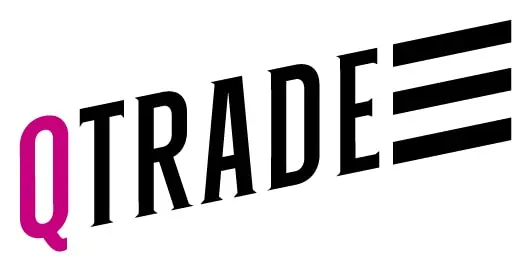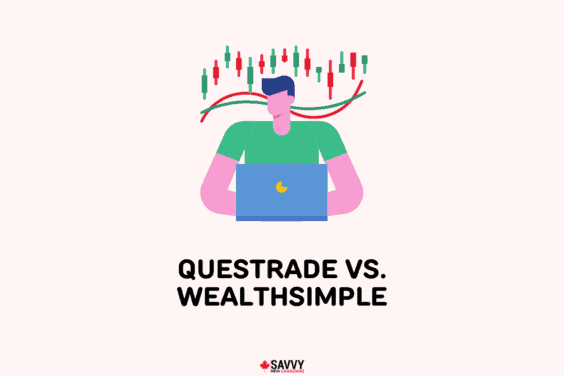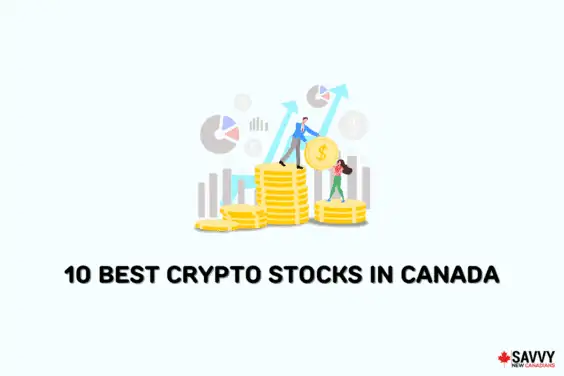Canadian banks make up a significant portion of investment portfolios in Canada.
Whether you are a beginner or an experienced investor, you probably have some exposure via direct bank stock holdings or through a Canadian bank ETF.
Even the broader financial ETFs and indices with diversified holdings in the insurance and financial services sectors are often heavily weighted in bank stocks.
This affinity to invest in Canadian banks is due to several factors, including their robust dividend yields (income generation) with consistent growth (Canadian Dividend Aristocrats) and solid price appreciation over time.
These Canadian banks are also very stable financially and rank as some of the best in the world.
Lastly, there is always the inherent “home bias” for Canadians to buy stocks and companies we are familiar with.
Read on to learn about the seven best Canadian Bank ETFs in April 2024.
Best Canadian Bank ETFs
The top picks for Canadian banking ETFs as of this writing are:
- BMO Equal Weight Banks Index ETF (ZEB)
- Horizons Equal Weight Canadian Banks ETF (HEWB)
- BMO Covered Call Canadian Banks ETF (ZWB)
- TD Canadian Bank Dividend Index ETF (TBNK)
- iShares S&P/TSX Capped Financials Index ETF (XFN)
- iShares Equal Weight Banc & Lifeco ETF (CEW)
- iShares Canadian Financial Monthly Income ETF (FIE)
While you can easily purchase shares (stocks) of Canadian banks online using a discount brokerage account, there is merit to purchasing an ETF portfolio that holds them all in one place.
For example, if you’d rather not bother about portfolio rebalancing or want to invest small amounts of money in portions of bank shares regularly.
That said, even beginners can now buy stocks for free and in small slices using Wealthsimple Fractional Shares.
1. BMO Equal Weight Banks Index ETF
The BMO Equal Weight Banks Index (ZEB) is an excellent choice if you want exposure to Canada’s six biggest banks.
This ETF is designed to track the performance of the Soloactive Equal Weight Canada Banks Index and is currently invested as follows (as of September 2023):
| ZEB Bank Holdings | Allocation |
| Canadian Imperial Bank of Commerce (CM) | 16.95% |
| Toronto-Dominion Bank (TD) | 16.91% |
| Bank of Montreal (BMO) | 16.82% |
| Royal Bank of Canada (RY) | 16.59% |
| Bank of Nova Scotia (BNS) | 16.38% |
| National Bank of Canada (NA) | 16.23% |
| Cash | 0.12% |
Some key facts for ZEB are:
- Inception date: October 20, 2009
- MER: 0.28%
- Number of holdings: 7
- Dividend yield: 5.21%
- Dividend distribution: Monthly
- Net asset: $4.127 billion
ZEB’s annualized distribution yield of 5.21% is decent; however, it is likely because stock prices for Canada’s banks have fallen in recent months.
You pay a 0.28% Management Expense Ratio (MER), which translates to $2.80 per year per $1,000 investment.
This ETF has had an annualized return of 9.65% since its inception and, after gaining 39.28% in 2021, has cooled off for a loss of -10.38% in a challenging year in 2022. So far in 2023, the ETF has traded flat.
Not surprisingly, this ETF has a “medium” risk rating. This is to be expected, given you are investing in only six stocks, which means limited diversification.
2. Horizons Equal Weight Canada Banks Index ETF
- Ticker Symbol: HEWB
- Inception date: January 22, 2019
- MER: 0.28%
- Number of holdings: 6
- Dividend yield: N/A
- Distribution frequency: N/A
- Net assets: $110 million
HEWB is another ETF that invests solely in the big six banks in Canada. This is a relatively new ETF, having only been introduced in 2019.
This ETF has a relatively low MER of 0.28%, which means fees on $1,000 in assets would be about $2.80 per year.
One drawback of investing in HEWB is that it currently does not pay a distribution, which is rare for Canadian bank ETFs.
This ETF has a medium risk rating and holds the following securities as of September 2023:
| HEWB Holdings | Allocation |
| TD Bank | 17.28% |
| Bank of Nova Scotia | 17.14% |
| Bank of Montreal | 16.74% |
| National Bank of Canada | 16.47% |
| CIBC | 16.30% |
| Royal Bank of Canada | 16.07% |
HEWB has provided an annualized return of 7.68% since its inception and a 0.08% return year to date in 2023.
Still, the lack of distribution will likely make this ETF less desirable to Canadian investors than other ETFs or owning these individual stocks instead.
3. BMO Covered Call Canadian Banks ETF
- Ticker symbol: ZWB
- Inception date: January 28, 2011
- MER: 0.71%
- Number of holdings: 42
- Dividend yield: 7.78%
- Distribution frequency: Monthly
- Net asset: $2.77 billion
The BMO Covered Call Canadian Banks ETF also invests in Canadian banks (top-six) and holds another Canadian bank ETF, ZEB.
Covered Call ETFs use covered call options to earn premiums, lower portfolio volatility, and potentially increase yield.
Compared to the 5.21% dividend yield for ZEB, ZWB had a distribution yield of 7.78% as of this writing.
Its management expense ratio is higher at 0.71%, which is equivalent to a fee of $7.10 per $1,000 investment per year.
The top ZWB.TO holdings in September 2023 are:
| ZWB Holdings | Allocation |
| BMO Equal Weight Banks Index ETF (ZEB) | 22.95% |
| CIBC | 13.06% |
| TD Bank | 13.04% |
| Bank of Montreal | 12.96% |
| RBC | 12.78% |
| Bank of Nova Scotia | 12.62% |
| National Bank | 12.51% |
It also holds several call options with various expiration dates and strike prices.
ZWB has an annualized return of 7.40% per year since its inception. The past couple of years have been difficult for Canadian banks, and the ETF provided a negative return of -11.15% in 2022 and -0.55% so far in 2023.
While this ETF has a higher dividend yield than ZEB, ZEB has a higher annualized return of 9.65% since inception.
- Ticker symbol: XFN
- Inception date: March 23, 2001
- MER: 0.61%
- Number of Holdings: 29
- Dividend yield: 3.30%
- Distribution frequency: Monthly
- Net assets: $1,407 million
The iShares S&P/TSX Capped Financials Index is a Financial ETF that provides exposure to Canadian financial companies, including banks and insurance firms.
XFN’s top-10 holdings as of September 2023 are:
| XFN Holdings | Allocation |
| RBC | 19.38% |
| TD Bank | 17.45% |
| BMO | 9.54% |
| Bank of Nova Scotia | 8.68% |
| Brookfield Corp Class A | 7.33% |
| CIBC | 5.77% |
| Manulife Financial Corp | 5.35% |
| Sun Life Financial Inc. | 4.54% |
| Intact Financial Corp | 4.05% |
| National Bank of Canada | 3.54% |
XFN offers a lot more diversification since it’s not concentrated in only six stocks.
It has a medium risk rating and comparable MER at 0.61, equivalent to a $6.10 fee per $1,000 investment per year.
The dividend yield for this ETF is significantly lower than, say, ZWB.TO at 4.16%, although it does payout dividends monthly.
Its average annual return since inception is 8.95%, and so far in 2023, it has returned about 2.2%.
5. TD Canadian Bank Dividend Index ETF
Below are some of its key facts:
- Ticker symbol: TBNK.TO
- Inception date: April 20th, 2023
- MER: 0.27%
- Number of holdings: 7
- Dividend yield: 4.78%
- Distribution frequency: Monthly
- Net assets: $4.60 million
TBNK.TO is a brand new Canadian bank ETF from TD Asset Management. It was established in April 2023 and tracks the largest bank stocks on the TSX.
As with most other Canadian bank ETFs, TBNK pays monthly dividends and holds only Canadian bank stocks. With a reasonable 0.27% MER, you only pay about $2.70 for every $1,000 invested annually.
Here are the top allocations in TBNK.TO as of September 2023:
| TBNK Holdings | Allocation |
| Bank of Montreal | 28.88% |
| National Bank of Canada | 22.99% |
| Royal Bank of Canada | 18.92% |
| Toronto-Dominion Bank | 14.7% |
| Canadian Imperial Bank of Commerce | 9.63% |
| Bank of Nova Scotia | 4.79% |
The iShares Equal Weight Banc & Lifeco ETF is another financial ETF with bank and life insurance stock holdings.
- Ticker symbol: CEW
- Inception date: February 6, 2008
- MER: 0.61%
- Number of holdings: 10
- Dividend yield: 4.31%
- Distribution frequency: Monthly
- Net assets: $182 million
CEW provides access to a diversified portfolio with the largest banks and life insurance companies and pays regular monthly dividends.
Its holdings as of September 2023 are:
| CEW Holdings | Allocation |
| Sun Life Financial Inc. | 10.26% |
| Manulife Financial Corp | 10.20% |
| IA Financial Inc. | 10.10% |
| Great West LifeCo Inc. | 10.05% |
| Toronto-Dominion Bank | 10.02% |
| BMO | 9.94% |
| CIBC | 9.85% |
| Bank of Nova Scotia | 9.84% |
| RBC | 9.80% |
| National Bank of Canada | 9.54% |
As of this writing, the dividend yield for CEW is 4.31%, which is about average for Canadian bank ETFs.
Its annualized return since inception is lower at 8.06%, and it saw a modest loss of -6.50% in 2022.
- Ticker symbol: FIE
- Inception date: April 16, 2010
- MER: 0.85%
- Number of holdings: 26
- Dividend yield: 7.49%
- Distribution frequency: Monthly
- Net assets: $898 million
The iShares Canadian Financial Monthly Income ETF (FIE.TO) qualifies as a financial/bank ETF as it provides exposure to the banking sector (48.08%), insurance (26.76%), and Financial Services (6.67%).
It seeks to “maximize total return and to provide a stable stream of monthly cash distributions.”
This ETF has a competitive 7.49% distribution yield but a high MER of 0.85%.
Its top-10 holdings in September 2023 are:
| FIE Holdings | Allocation |
| iShares S&P/TSX Canadian Preferred ETF | 19.75% |
| iShares Canadian Corp Bond Index ETF | 9.96% |
| RBC | 7.58% |
| Toronto-Dominion Bank | 6.81% |
| Manulife Financial Corp | 6.77% |
| CIBC | 6.30% |
| Bank of Montreal | 6.13% |
| National Bank of Canada | 5.86% |
| IA Financial Inc | 4.35% |
| Bank of Nova Scotia | 4.07% |
FIE has a medium risk rating, and its average annual return since inception is 6.49%.
How To Buy Canadian Bank ETFs in Canada
There are several options for retail investors who want to buy and sell Canadian bank ETFs.
If you already have a brokerage account with your bank (e.g. TD Direct Investing or Scotia iTrade), you can find these ETFs easily using their tickers.
Cost-conscious investors can save on trading commissions using no- or low-commission brokers like Qtrade, Questrade or Wealthsimple Trade.
Qtrade

On QTrade’s Website
- Fees: $8.75 per trade, commission-free on 100+ ETFs
- Account minimum: Fees on balances under $25,000
- Promotion: Get up to $150 bonus
Questrade
This independent brokerage platform offers free ETF purchases, and you pay $4.95 – $9.95 per trade when you sell.
Questrade offers other investment assets, including options, FX, stocks, bonds, mutual funds, GICs, CFDs, and precious metals.
New clients get $50 in free stock and ETF trades when they open an account here and fund it with $1,000 or more.
Get more details in this Questrade review.
Questrade

Trade stocks, ETFs, options, FX, bonds, CFDs, mutual funds, etc.
Get $50 trade credit with $1,000 funding
Low and competitive trading fees
No quarterly inactivity fees
Access to advanced tools and trading data
Top platform for advanced traders
Transfer fees waived
Wealthsimple Trade
This Canadian brokerage platform allows you to buy and sell ETFs and stocks while saving on trading fees. It is available on desktops and smartphones and has no minimum investment requirements.
Wealthsimple Trade also offers fractional share trading, making it easy to buy small portions of stocks if you don’t want to buy an entire share.
Canadian investors who want to buy ETFs and stocks and dabble in options and currency trading can use Questrade to save on commissions.
You receive a $25 bonus when you open an account and deposit $200+.
Wealthsimple Trade

Trade stocks, ETFs, and options
Excellent trading platform for beginners
Deposit $150+ to get a $25 cash bonus
Transfer fees waived up to $150
Looking for a Canadian stock advisor website? Check out The Motley Fool.
Stock Advisor Canada

Unlimited access to expert stock recommendations
Almost doubled the S&P/TSX Index over last 9 years
New stock picks every month
50,000+ members
$1.90 weekly (66% discount)
Should I Invest in a Canadian Bank ETF?
Whether to invest using a Canadian Bank ETF is a choice you must make depending on your investment objectives, confidence with asset allocation, rebalancing, and your comfort level with paying investment fees.
Several of the best Canadian Bank ETFs on this list comprise the biggest 6 banks.
Ideally, you could gain exposure to these banks by simply replicating your preferred bank ETF and buying the six stocks directly yourself.
With no-commission stock trading, you don’t pay trading fees and also save the management fee of 0.60% or higher yearly.
The downside to this DIY approach is that you will need to rebalance the stock weightings 1-2 times a year to keep things within your desired allocation.
Even investors with a small account will be able to try this DIY approach soon by using fractional share trading.
If you are looking to generate regular income from Canadian bank stocks but aren’t so sure you can manage the hassle of rebalancing, a Canadian bank ETF is definitely worth checking out.
These ETFs can also help to increase your portfolio diversification (several stocks as opposed to holding just 1-2 stocks).
Enhanced diversification reduces portfolio volatility and could potentially increase your overall returns.
An even better way to protect your investments from the volatile swings of the stock market is to use an asset allocation ETF.
Asset allocation ETFs are self-rebalancing and hold thousands of securities with global exposure and diversification.
Some popular examples are VGRO, VBAL, VEQT, ZBAL, and ZGRO.
The Best Canadian Bank ETF is…
The best Canadian bank ETF will vary depending on your specific needs.
If you are highly fee-conscious, BMO’s ZEB.TO currently has the lowest MER on the list at 0.28%, and its 5.21% dividend yield is one of the best (for bank ETFs that are not using covered calls). Its returns in the last year are also exceptional.
Investors who want to maximize the monthly or quarterly income or distribution may favour a covered-call strategy bank ETF like ZWB.
While these funds may lag in total return in performance during an extended bullish run, you enjoy good dividend payouts, and there is some downside protection.
Related reading:








Hi,
I think that you should add HCAL to the list.
Thanks.
Thanks for this article and all your content. I just subscribed; keep up the great work! Quick question: would you suggest adding bank stocks or for me, an ETF like ZEB to my new portfolio, to combat the upcoming uncertainty? I’ve read that with higher rates, the banks will obviously benefit, so to hedge any losses from an equity-heavy portfolio, it’s good to have some banks and REITs in there too. I am just starting out with upping my TFSA, so any advice would be great, thanks.
@SLM: Thanks for your feedback. I am unable to provide specific investment advice. That said, I prefer to use all-in-one ETFs like VGRO, VEQT, and other asset allocation ETFs as opposed to selecting individual stocks or even a bank-specific ETF. This way I can gain exposure to the “entire” stock market and it really doesn’t matter much what happens in the short term. It is likely that banks will do well in a higher rate environment and you could do well by adding on some banks…but the overall stock market should also rise alongside unless we slide into a recession.
Hello Enoch- great article. Are there any Canadian Bank ETFs that trade in the US?
@Barry: I am not aware of any. Cheers
You should consider BANK from Evolve for your next article.